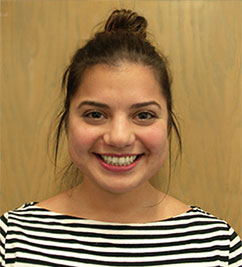Engineering Success
December 12, 2012

Golnaz Arastoopour
It’s not common to see a graduate student participating in a National Science Foundation review panel. Consider Golnaz Arastoopour an outlier.
Arastoopour, a third-year student of David Shaffer and a researcher for the Epistemic Games Group, was chosen to lead a group of researchers in reviewing submitted grant proposals.
“My advisor, David Shaffer, is very well-connected in this field, and he recommended me to the NSF,” Arastoopour said. “I think I was chosen because we’ve done a lot of research on the area that the proposals were focused on. Our interdisciplinary work with engineering, education, and games really gives David’s grad students, including me, lots of opportunities.”
The National Science Foundation annually awards billions of dollars to research projects in the United States, accounting for roughly 20 percent of all basic research spending in the country. The total includes hundreds of millions of dollars in research in the educational sciences. As part of its grant review process, the NSF invites experts to meet for two to three days, to analyze and rank projects specific to their areas of specialty.
Though Arastoopour is barred from discussing the details of the review she led for the NSF, she said working in David Shaffer’s Epistemic Games lab gave her the expertise she needed to be useful to the panel. Her own background, as a trained engineer and former teacher with a master’s degree in math education, also helped.
“The NSF is looking for feedback on the project’s intellectual merit and broader impacts to society,” Arastoopour said. “Some of these proposals are asking for millions of dollars, so it’s a serious and important job. It was really an honor to know that the outside community thinks that I have some level of expertise to be able to contribute towards making these types of decisions.”
For one grant proposal, Arastoopour played the role of primary reviewer, as she directed the conversation between experts to concentrate on the key elements of the proposal. She then was responsible for summarizing for the NSF project officer everything that had been said and agreed upon during the discussions.
“Overall, it was a great experience,” Arastoopour said. “Everyone on my panel was really supportive, respectful and engaged in the process. That’s not to say there weren’t disagreements -- there were lots -- but that lead to a richer conversation and a more comprehensive evaluation of the proposal.”
Following her performance on the big stage, Arastoopour returned to her lab on the fourth floor of the Educational Sciences tower. She’s already gotten back into the daily grind. For the past three years, she’s worked with David Shaffer on Nephrotex, an epistemic game in which undergraduate engineering students role-play as professional engineers-in-training in order to develop the skills, knowledge, identity, and values of engineers.
“Our results have shown that after playing Nephrotex, students view the engineering field more positively than before. It’s especially beneficial for women,” Arastoopour said.
Her experience with Nephrotex has given her the desire to build more games and career simulations, perhaps even beyond grad school.
“I want to build on the ideas that are being developed here,” she said. “I’m not exactly sure what that’s going to look like yet, but that’s kind of exciting. The biggest goal for me is to get kids to think more critically, and think in terms of relevant professional practices that are out there. Right now traditional schooling isn’t very effective for teaching kids real-world skills and complex thinking. So if we want to reflect what’s actually happening in society, then we need to simulate for kids what’s happening in the world outside the classroom.”


